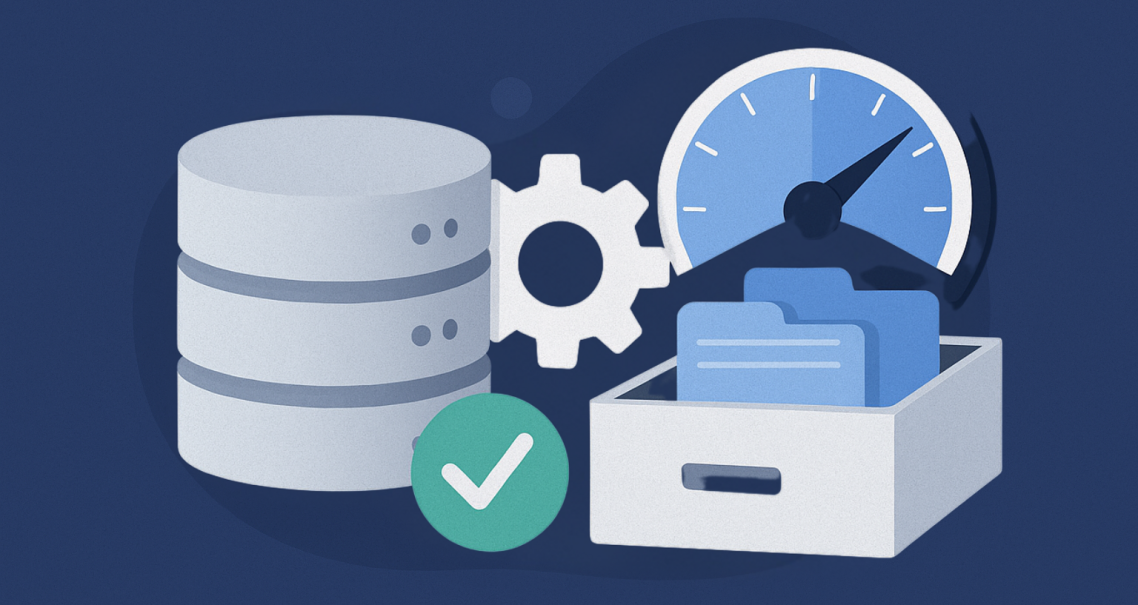
Database Health for WordPress Speed
When people talk about speeding up WordPress, they often think about caching, images, and hosting. One area that gets overlooked is the database. Every page load depends on database queries, and if your database is bloated or unoptimized, it will slow down your site no matter what plugins you use.
Taking care of your WordPress database keeps queries fast, improves Time to First Byte (TTFB), and reduces stress on your server. This guide explains why database health matters and how to keep yours lean and efficient.
Understanding the WordPress Database
WordPress relies on a MySQL or MariaDB database. At its core are tables such as:
-
wp_posts: Stores posts, pages, and custom post types.
-
wp_postmeta: Contains metadata for posts, often added by plugins.
-
wp_options: Holds site settings and plugin data.
-
wp_comments: Stores comments and related metadata.
Over time, these tables can fill with extra rows that slow down queries. Plugins and themes often add data too, which is why maintenance is critical.
Common Sources of Database Bloat
Some of the most frequent culprits include:
-
Post revisions: Every time you update a post, WordPress stores a copy. Hundreds of revisions can add up.
-
Drafts and trashed posts: Old content that never gets cleaned out.
-
Orphaned postmeta: Metadata left behind when posts are deleted.
-
Expired transients: Temporary data that plugins fail to remove.
-
Unused tables: Left behind when plugins are uninstalled.
-
Large autoloaded options: Data loaded on every request, even when not needed.
Each of these adds weight, and too much autoloaded data can noticeably slow down TTFB.
How to Diagnose Slow Queries
If your site feels sluggish, it’s worth checking whether the database is at fault. Tools like Query Monitor can show you slow queries and which plugins or themes are responsible.
On the server side, enabling the MySQL slow query log can highlight queries that take longer than expected. You can also run SHOW PROCESSLIST in MySQL to see queries running in real time.
Steps to Clean and Optimize
A healthier database starts with regular cleanup. Some best practices:
-
Delete unnecessary post revisions, drafts, and spam comments.
-
Remove orphaned postmeta rows.
-
Clean up expired transients.
-
Split large arrays into non-autoloaded options if they don’t need to run on every page load.
Plugins like WP-Optimize, WP-Sweep, or Advanced Database Cleaner make this process easier. If you’re comfortable with WP-CLI, you can run commands like:
wp transient delete –all
wp post delete $(wp post list –post_type=’revision’ –format=ids) –force
Always back up your database before making changes.
Indexing for Performance
Indexes help databases retrieve data faster. By default, WordPress doesn’t index certain fields that large sites rely on, especially in the wp_postmeta table.
A plugin like Index WP MySQL for Speed can add indexes to improve query times significantly. This is especially important for sites that use Advanced Custom Fields or custom post types with heavy metadata.
Object Caching for Dynamic Sites
Dynamic sites like WooCommerce stores or membership platforms benefit from object caching. This saves query results in memory using systems like Redis or Memcached.
Enabling Redis with a plugin like Redis Object Cache reduces the number of times your site has to hit the database, speeding up both frontend pages and admin dashboards.
Routine Maintenance Tips
-
Schedule database cleanups weekly or monthly.
-
Always test cleanup operations on a staging site first.
-
Monitor autoloaded data in the wp_options table and keep it lean.
-
Remove unused plugins to prevent new bloat.
Making database health part of your regular maintenance routine prevents slowdowns before they start.
A clean database is a fast database. By trimming revisions, deleting unused data, indexing postmeta, and enabling object caching, you can reduce query times and improve overall site speed.
Hosting, caching, and image optimization may get more attention, but your database is just as important. Treat it with care, keep it lean, and your WordPress site will reward you with faster performance and fewer headaches.



